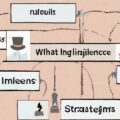Understanding Emotional Intelligence
Emotional intelligence (EI), a term coined by psychologists Peter Salovey and John Mayer and popularized by Daniel Goleman, refers to the ability to recognize, understand, and manage our own emotions, as well as the emotions of others. It encompasses five key components: self-awareness, self-regulation, motivation, empathy, and social skills.
The Importance of Emotional Intelligence
Emotional intelligence plays a critical role in both personal and professional success. High EI can lead to better relationships, improved mental health, and enhanced leadership abilities. It enables individuals to navigate social complexities, manage behavior, and make personal decisions that achieve positive results.
Steps to Develop Emotional Intelligence
1. Self-Awareness
Self-awareness is the cornerstone of emotional intelligence. It involves recognizing and understanding your own emotions, triggers, and responses. To enhance self-awareness, consider keeping a journal to reflect on daily experiences and emotional reactions.
2. Self-Regulation
Self-regulation involves managing your emotions in healthy ways. Techniques such as mindfulness, deep breathing exercises, and cognitive reframing can help you stay calm and composed, even in stressful situations.
3. Motivation
Motivation, in the context of EI, refers to the inner drive to pursue goals with energy and persistence. Cultivate a positive attitude, set achievable goals, and celebrate your successes to maintain high levels of motivation.
4. Empathy
Empathy is the ability to understand and share the feelings of others. Practice active listening, put yourself in others’ shoes, and respond with compassion to build empathy.
5. Social Skills
Strong social skills are essential for effective communication and relationship building. Enhance your social skills by practicing assertiveness, improving your body language, and developing conflict resolution techniques.
Practical Exercises to Boost Emotional Intelligence
Implementing practical exercises can significantly boost your emotional intelligence. Here are a few exercises to consider:
- Mindfulness Meditation: Regular mindfulness practice can increase self-awareness and emotional regulation.
- Emotional Check-Ins: Set aside time each day to reflect on your emotions and their impact on your behavior.
- Empathy Mapping: Create empathy maps to understand the perspectives and emotional states of others.
- Role-Playing: Engage in role-playing scenarios to practice social skills and empathy in a controlled environment.
Challenges in Developing Emotional Intelligence
Developing emotional intelligence is not without its challenges. Common obstacles include deeply ingrained habits, resistance to change, and a lack of awareness. Overcoming these challenges requires persistence, openness to feedback, and a commitment to personal growth.
FAQ
1. What is emotional intelligence?
Emotional intelligence is the ability to recognize, understand, and manage our own emotions and the emotions of others. It includes skills such as self-awareness, self-regulation, motivation, empathy, and social skills.
2. Why is emotional intelligence important?
Emotional intelligence is important because it affects our ability to communicate, empathize, and build relationships. High EI is linked to better mental health, job performance, and leadership skills.
3. Can emotional intelligence be learned?
Yes, emotional intelligence can be developed through practice and training. Techniques such as mindfulness, emotional check-ins, and empathy exercises can help enhance EI.
4. How can I improve my self-awareness?
Improving self-awareness involves reflecting on your emotions and behavior. Keeping a journal, practicing mindfulness, and seeking feedback from others can help increase self-awareness.
5. What are some common challenges in developing emotional intelligence?
Common challenges include ingrained habits, resistance to change, and lack of awareness. Overcoming these challenges requires persistence and a commitment to self-improvement.









